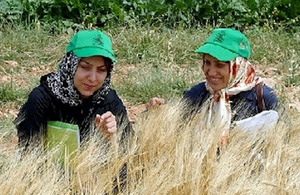DFID Research: Sharing knowledge through story telling
Can storytelling help farmers share knowledge and experience with scientists?

Barley farmers discuss crop traits during a conference field trip. Picture: ICARDA
Stories are a common tool used by farmers to communicate and get their message across. So could storytelling be a useful way for farmers to share experiences and information with scientists? The Participatory Plant Breeding (PPB) program of the International Centre for Agricultural Research in the Dry Areas (ICARDA) wanted to give it a try, in order to demonstrate to researchers the value of farmer knowledge in plant breeding processes. With support from the Knowledge Sharing in Research (KSinR) project, of the CGIAR’s Information Communication Technology and Knowledge Management Program, this ICARDA-led Pilot Project is examining the value of storytelling, as a way of helping farmers to share their findings during PPB trials, and discuss their experience of farming more generally.
In May 2008, a 4 day International Farmers’ Conference was organised bringing together more than 50 farmers from Syria, Algeria, Iran, Jordan, Egypt and Eritrea with researchers at ICARDA HQ in Syria. Instead of the standard conference format, the farmers were asked to share their experiences of farming and plant breeding through storytelling. The importance of better communication between crop breeders and farmers was underlined by Dr. Stefania Grando, Senior Researcher of the PPB at ICARDA: “PPB is being adopted relatively slowly, despite its proven efficacy, often due to a reluctance to work with farmers, amidst doubts of the knowledge and experience that farmers may have.”
Are you sitting comfortably?
According to 2 of the conference organisers, Alessandra Galie and Bernhard Hack, the storytelling format was flexible enough to accommodate whatever issues the participants wanted to discuss, while also being less formal than conventional presentations. Participants found them easy to understand, with farmers from Syria commenting that the stories were “better than speeches, because they felt more like real life.”
Ruqeia, a young Syrian farmer, believed she had learned a lot, particularly from the other Syrian farmers, about planting, fertiliser use, harvesting and storing seeds, and would use this new knowledge in her fields during the next year. Such farmer-to-farmer extension was, according to scientist and participant Maatougui Mohammad (ICARDA), a key benefit of the conference, of particular value to farmers from countries whose formal extension services are weak or non-existent.
Spreading the word
The Farmers’ Conference is one of a number of strategies now being explored under the KSinR project. Other approaches being piloted include the use of farmer fairs and participatory evaluation workshops, as well as radio programmes, training videos, and databases to better communicate research findings to target groups. The farmers’ stories will now be featured on a conference website (www.icarda.org/farmersconference), in the form of audio files and written transcripts, translated into all the languages spoken by the participants. The site will also contain video clips of the storytelling, which can be sent by mobile phone. Sami Jaber, a farmer from Al Sweida in Syria, began his story with a saying: “If you don’t plant it, you don’t experience it.” The organisers are hopeful that retelling the stories, whether in person, online or by phone will help to spread the knowledge that comes from experience, for the benefit of other farmers and the crop breeders who work on their behalf.
More information
This case study is based on an article originally published in the DFID-supported New Agriculturist in September 2008